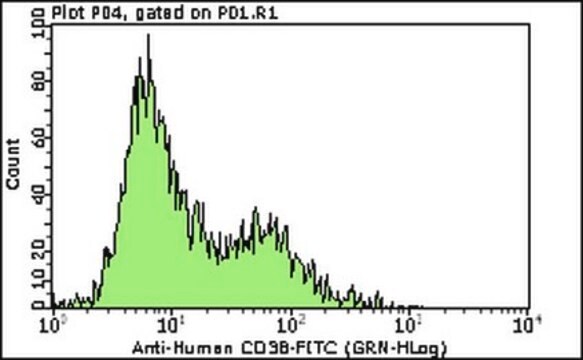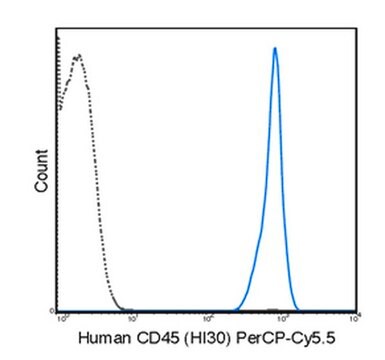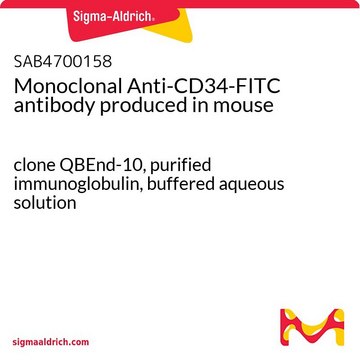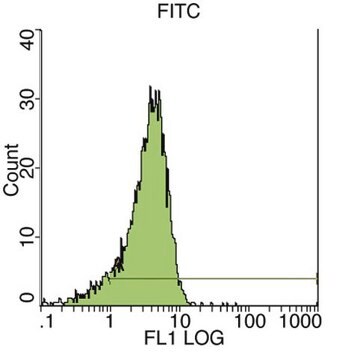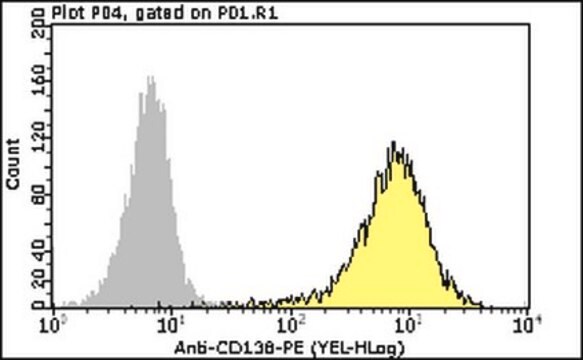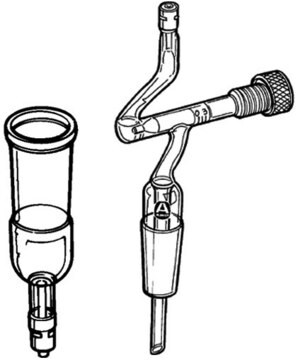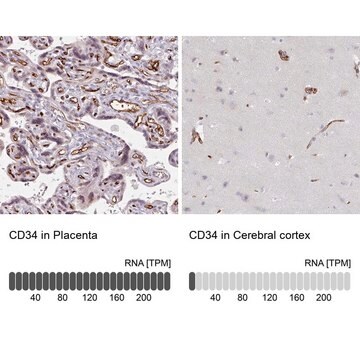CBL496F
Anti-CD34 Class II Antibody, clone QBEND/10, FITC conjugated
clone QBEND/10, Chemicon®, from mouse
Sign Into View Organizational & Contract Pricing
All Photos(2)
About This Item
UNSPSC Code:
12352203
eCl@ss:
32160702
NACRES:
NA.41
Recommended Products
biological source
mouse
Quality Level
conjugate
FITC conjugate
antibody form
affinity isolated antibody
antibody product type
primary antibodies
clone
QBEND/10, monoclonal
species reactivity
monkey, human
manufacturer/tradename
Chemicon®
technique(s)
flow cytometry: suitable
isotype
IgG1
NCBI accession no.
UniProt accession no.
shipped in
wet ice
target post-translational modification
unmodified
Gene Information
human ... CD34(947)
Related Categories
Specificity
The antibody recognizes a heavily glycosylated transmembrane protein: gp 105-120 kDa. The antigen is expressed on immature human haemopoietic precursor cells, capillary endothelial cells and human myeloid cells in the following categories: subsets of CFU-GEMM and BFU-E, all CFU-GM, granulocyte precursors, monocytes, myeloid leukaemias. This antibody recognizes the class II epitope showing resistance to neuraminidase enzyme cleavage.
FUSION PARTNER: NSO myeloma cell line
FUSION PARTNER: NSO myeloma cell line
Immunogen
Human endothelial vesicles
Application
Identification of haemopoietic progenitor cells
Studies into the control mechanisms of early haemopoiesis
Purification of haemopoietic cells from, for example, FACS
The antibody reacts with both frozen and fixed tissue sections from vascular endothelium and stromal fibroblasts
Optimal working dilutions must be determined by the end user.
Studies into the control mechanisms of early haemopoiesis
Purification of haemopoietic cells from, for example, FACS
The antibody reacts with both frozen and fixed tissue sections from vascular endothelium and stromal fibroblasts
Optimal working dilutions must be determined by the end user.
Research Category
Inflammation & Immunology
Inflammation & Immunology
Research Sub Category
Immunoglobulins & Immunology
Immunoglobulins & Immunology
This Anti-CD34 Antibody (Class II), clone QBEND/10, FITC conjugated is validated for use in FC for the detection of CD34 Class II.
Physical form
The conjugate is supplied as a 100 test vial in phosphate buffered saline containing 10mM sodium azide and 1mg/ml bovine serum albumin. For flow cytometry we recommend using 10μL of conjugate per test.
Storage and Stability
Store at +4°C protected from light. DO NOT FREEZE. For long term use and storage aliquot conjugate into small volumes and store at +4°C.
Legal Information
CHEMICON is a registered trademark of Merck KGaA, Darmstadt, Germany
Disclaimer
Unless otherwise stated in our catalog or other company documentation accompanying the product(s), our products are intended for research use only and are not to be used for any other purpose, which includes but is not limited to, unauthorized commercial uses, in vitro diagnostic uses, ex vivo or in vivo therapeutic uses or any type of consumption or application to humans or animals.
Not finding the right product?
Try our Product Selector Tool.
Storage Class Code
12 - Non Combustible Liquids
WGK
WGK 2
Flash Point(F)
Not applicable
Flash Point(C)
Not applicable
Certificates of Analysis (COA)
Search for Certificates of Analysis (COA) by entering the products Lot/Batch Number. Lot and Batch Numbers can be found on a product’s label following the words ‘Lot’ or ‘Batch’.
Already Own This Product?
Find documentation for the products that you have recently purchased in the Document Library.
Marlen Kolbe et al.
Tissue engineering. Part A, 17(17-18), 2199-2212 (2011-05-03)
Mesenchymal stem cells (MSC) from bone marrow and outgrowth endothelial cells (OEC) from peripheral blood are considered as attractive cell types for applications in regenerative medicine aiming to build up complex vascularized tissue-engineered constructs. MSC provide several advantages such as
L Fina et al.
Blood, 75(12), 2417-2426 (1990-06-15)
All seven of a set of CD34 monoclonal antibodies that recognize epitopes on an approximately 110 Kd glycoprotein on human hemopoietic progenitor cells also bind to vascular endothelium. Capillaries of most tissues are CD34 positive, as are umbilical artery and
Our team of scientists has experience in all areas of research including Life Science, Material Science, Chemical Synthesis, Chromatography, Analytical and many others.
Contact Technical Service
